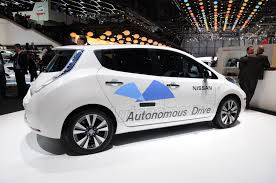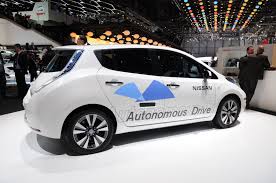
A growing concern among the world's top luxury carmakers such as BMW and Daimler that robocars may not live up to the profit expectations that drove an initial investment rush is pushing them to talk about the virtues of having a bigger pool of engineers to develop a self-driving car as they announce alliances with suppliers.
With the aim of spreading the investment burden and risk of autonomous driving systems, these carmakers are increasingly looking to forego outright ownership of such future autonomous systems.
It was just about a year ago that these carmakers were focused on tackling the engineering challenge of developing a self-driving car, rather than on the business case and hence were pursuing standalone strategies and this present trend represents a clear shift in strategy from the earlier one.
"Although it is a substantial market, it may not be worth the scale of investments currently being sunk into it," said a board member at one of the German carmakers to Reuters but declined to be identified because the matter is confidential.
According to consulting firm Frost & Sullivan, only about 10 to 15 percent of vehicles in Europe by 2030 will be made up by Dozens of companies - including carmakers and tech firms like Google and Uber – who are vying for the market. And hence it is anticipated that there are sure to be losers.
"It's impossible for me to believe there will be 50 successful autonomous vehicle software producers," said John Hoffecker, global vice chairman of Michigan-based consulting firm AlixPartners.
Deciding in favor of teaming up with chipmaker Intel and camera and software manufacturer Mobileye to build a platform for autonomous cars technology by 2021, BMW became the first major carmaker to abandon its solo development of self-driving cars in July last year.
to gauge BMW's competitive position, a trip by company senior executives was made to startups and suppliers and the decision followed soon after.
"Sitting at other companies, one rattles off the technological challenges and safety aspects, and you come to realize that many of us are swimming in the same sludge," Klaus Buettner, BMW's vice president autonomous driving projects, said.
"Everybody is investing billions. Our view was that it makes sense to club together to develop some core systems as a platform."
Higher-end cars are already able to keep themselves in lane and adjust their speed in motorway driving on their own due to partial autonomy. It is likely to be years before each of the next stages - "eyes off", "mind off" and ultimately driverless autonomy - becomes reality.
Just like it did with its first-generation electric cars, BMW was likely to lose money with its first fully autonomous vehicles, said Klaus Froehlich, BMW's board member responsible for development. But in order to stay relevant as a carmaker, developing the technology remains a necessity.
"It is an enabling technology, not a business case," he said about BMW's decision to develop autonomous vehicles. "But if the burden can be shared on a platform, I have nothing against that."
Driverless on-demand taxis, which may one day come to replace regular cabs and parts of public transport in large cities, is one of the most financially promising markets that autonomous technology will open up.
According to Boston Consulting Group, regulators, in recent times, are pushing for a creation of standards for the new technology, which has the potential to improve vehicle reflexes and cut accidents by up to 90 percent, and the emergence of alliances involving the likes of BMW and Mercedes-Benz comes at such a time.
Calling into question the wisdom of high-stakes, go-it-alone strategies, industry experts say such standardization could make it much harder to develop a product which stands out.
(Source:www.reuters.com)
With the aim of spreading the investment burden and risk of autonomous driving systems, these carmakers are increasingly looking to forego outright ownership of such future autonomous systems.
It was just about a year ago that these carmakers were focused on tackling the engineering challenge of developing a self-driving car, rather than on the business case and hence were pursuing standalone strategies and this present trend represents a clear shift in strategy from the earlier one.
"Although it is a substantial market, it may not be worth the scale of investments currently being sunk into it," said a board member at one of the German carmakers to Reuters but declined to be identified because the matter is confidential.
According to consulting firm Frost & Sullivan, only about 10 to 15 percent of vehicles in Europe by 2030 will be made up by Dozens of companies - including carmakers and tech firms like Google and Uber – who are vying for the market. And hence it is anticipated that there are sure to be losers.
"It's impossible for me to believe there will be 50 successful autonomous vehicle software producers," said John Hoffecker, global vice chairman of Michigan-based consulting firm AlixPartners.
Deciding in favor of teaming up with chipmaker Intel and camera and software manufacturer Mobileye to build a platform for autonomous cars technology by 2021, BMW became the first major carmaker to abandon its solo development of self-driving cars in July last year.
to gauge BMW's competitive position, a trip by company senior executives was made to startups and suppliers and the decision followed soon after.
"Sitting at other companies, one rattles off the technological challenges and safety aspects, and you come to realize that many of us are swimming in the same sludge," Klaus Buettner, BMW's vice president autonomous driving projects, said.
"Everybody is investing billions. Our view was that it makes sense to club together to develop some core systems as a platform."
Higher-end cars are already able to keep themselves in lane and adjust their speed in motorway driving on their own due to partial autonomy. It is likely to be years before each of the next stages - "eyes off", "mind off" and ultimately driverless autonomy - becomes reality.
Just like it did with its first-generation electric cars, BMW was likely to lose money with its first fully autonomous vehicles, said Klaus Froehlich, BMW's board member responsible for development. But in order to stay relevant as a carmaker, developing the technology remains a necessity.
"It is an enabling technology, not a business case," he said about BMW's decision to develop autonomous vehicles. "But if the burden can be shared on a platform, I have nothing against that."
Driverless on-demand taxis, which may one day come to replace regular cabs and parts of public transport in large cities, is one of the most financially promising markets that autonomous technology will open up.
According to Boston Consulting Group, regulators, in recent times, are pushing for a creation of standards for the new technology, which has the potential to improve vehicle reflexes and cut accidents by up to 90 percent, and the emergence of alliances involving the likes of BMW and Mercedes-Benz comes at such a time.
Calling into question the wisdom of high-stakes, go-it-alone strategies, industry experts say such standardization could make it much harder to develop a product which stands out.
(Source:www.reuters.com)














